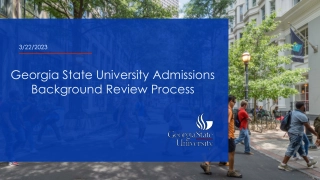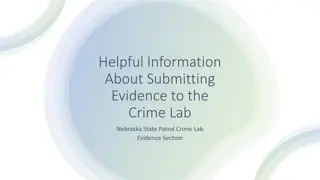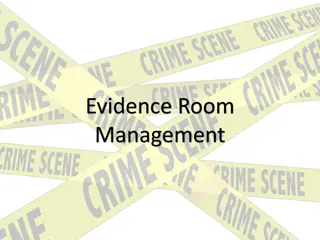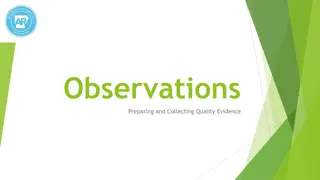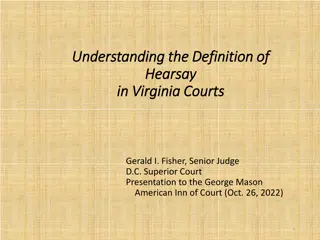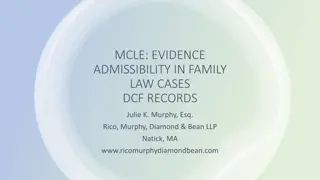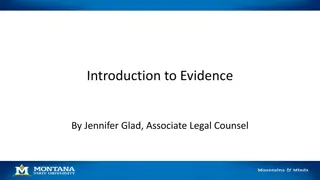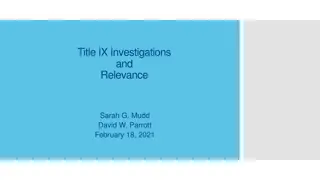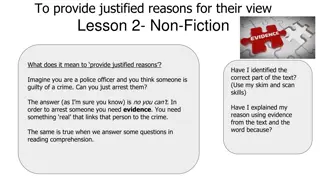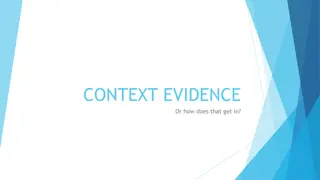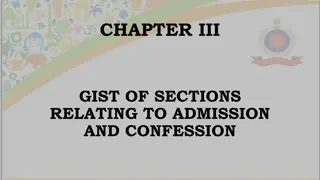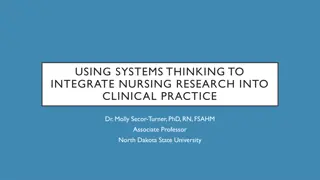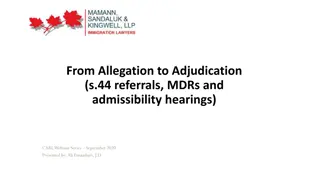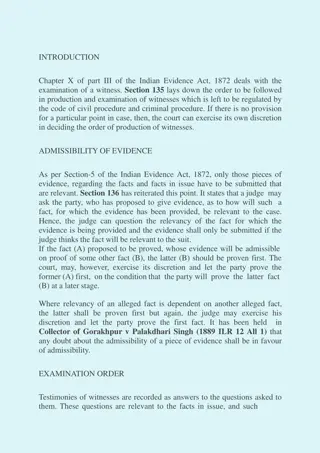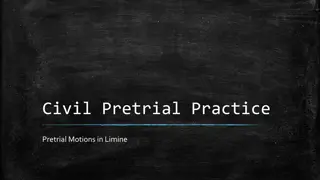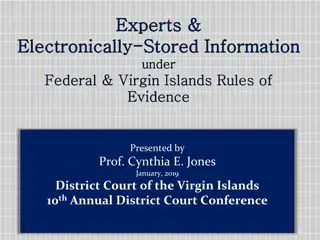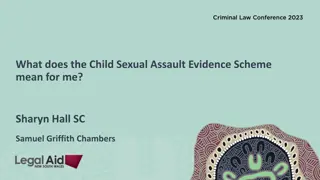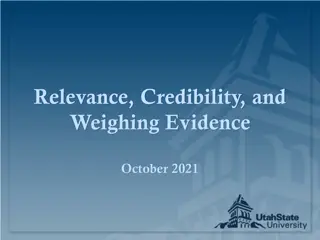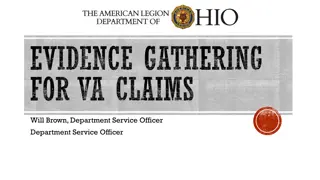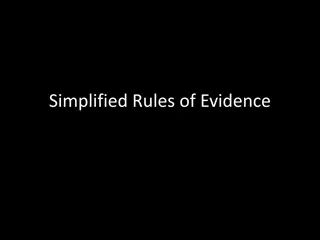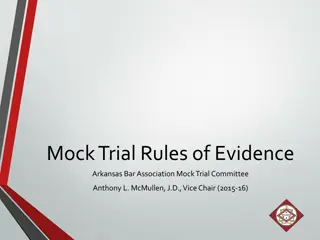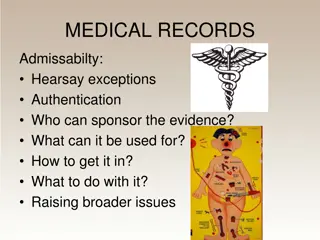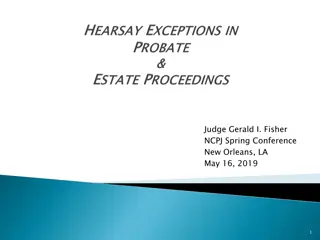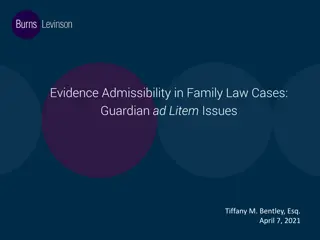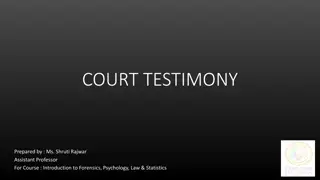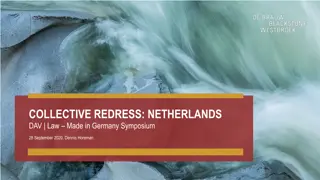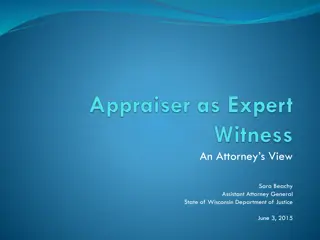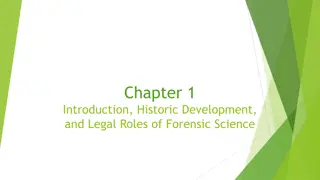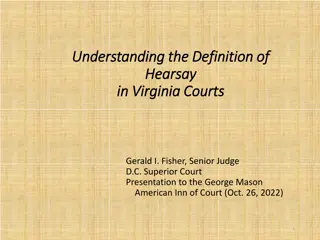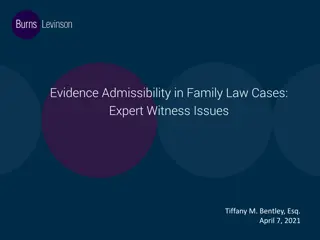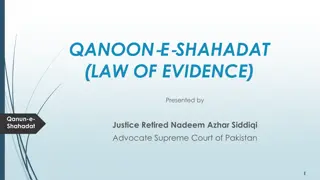Georgia State University Admissions Background Review Process
Georgia State University conducts a comprehensive Admissions Background Review (ABR) process to assess applicants' admissibility based on reported information and potential threats to the campus. The ABR Committee evaluates responses to specific admissions background questions, referring cases invol
1 views • 11 slides
The Role of Artifacts and Evidence in Educator Evaluation and Support
Exploring the role of artifacts and evidence in educator evaluation, this content covers the three categories of evidence required by the Oregon Framework. It delves into the efficient process that reduces redundancy, essential components of SLG goals, and the types of evidence relevant to professio
0 views • 15 slides
Understanding Impression Evidence Collection in CSI Investigations
Impression evidence plays a crucial role in investigations, including shoeprints, tool marks, tire tracks, bite marks, and riffling marks on bullets. This evidence can be collected in 2D using photography or tape lifts, and in 3D through casting methods. Differentiating between class and individual
0 views • 21 slides
Helpful Information About Submitting Evidence to the Crime Lab.
Helpful information about submitting evidence to the Nebraska State Patrol Crime Lab's Evidence Section. Learn about the NSP 750 Evidence Submittal Form, submission process, and guidelines for resubmissions. Ensure all necessary details are provided for proper analysis of evidence.
5 views • 16 slides
Illegally obtained evidence
Illegally obtained evidence refers to evidence acquired through unlawful means, such as searches without warrants or extraction under duress. The Fruit of the Poisonous Tree doctrine renders evidence inadmissible if derived from illegally obtained evidence. The Exclusionary Rule prohibits the use of
2 views • 30 slides
Evidence Room Management
Explore the intricacies of evidence room management in a law enforcement setting, including the roles of individuals like Greg Van Buskirk, differences in crime scene management between large and small departments, the distinction between property and evidence, the importance of maintaining chain of
0 views • 8 slides
Enhancing Evidence Collection in Education
Explore the importance of minimizing bias in evidence collection, review different types of evidence, identify strategies to collect quality evidence effectively, understand common biases affecting assessment, and learn to spot and address biased statements. Practice eliminating biased language and
0 views • 11 slides
Understanding the Definition of Hearsay in Virginia Courts by Gerald I. Fisher, Senior Judge
Preliminary principles and rules regarding hearsay in Virginia courts, including the effective date of the Virginia Rules of Evidence, application of rules in various trial scenarios, criteria for admissibility of evidence by trial judges, and reasons for the legal distrust of hearsay evidence. The
1 views • 78 slides
Admissibility of Evidence in Family Law Cases & DCF Records
Explore the admissibility of evidence in family law cases and the handling of Department of Children and Families (DCF) records in civil proceedings. The regulations for releasing records, obtaining consent, and seeking court orders are detailed, emphasizing the importance of protecting the best int
1 views • 13 slides
Understanding Evidence in Investigations
Learn about the principles and types of evidence in investigations, including inculpatory and exculpatory evidence, physical, documentary, demonstrative, and verbal evidence. Explore sources of evidence and the significance of collecting relevant information to ensure a fair investigative process.
0 views • 14 slides
Understanding Title IX Investigations and the Role of Evidence Collection
The purpose of a Title IX investigation is to collect relevant evidence, both inculpatory and exculpatory, to allow for impartial decision-making regarding reported sexual harassment cases. Parties involved must receive sufficient notice and have opportunities to participate, present statements, and
1 views • 32 slides
Providing Justified Reasons in Reading Comprehension
Providing justified reasons in reading comprehension involves using evidence from the text to support one's answer, similar to presenting evidence in a legal case. Just as a police officer needs evidence to make an arrest, readers need textual evidence and the word "because" to support their respons
0 views • 11 slides
Understanding Context Evidence in Legal Proceedings
Context evidence in legal proceedings refers to evidence of acts not charged in the indictment, used to provide a background for understanding specific allegations. This type of evidence is often relied upon by the prosecution to explain events or behaviors that may seem isolated or surprising. It i
1 views • 13 slides
Legal Provisions on Admission and Confession in Criminal Proceedings
The content highlights key sections related to admission and confession in criminal proceedings. It defines admission and explains the relevance of inducement, threat, or promise in a confession. It also emphasizes restrictions on confessions made to a police officer. These sections play a crucial r
0 views • 28 slides
Integrating Nursing Research into Clinical Practice with Systems Thinking
Dr. Molly Secor-Turner emphasizes the importance of evidence-based practice (EBP) in nursing. EBP, derived from rigorous research, leads to quality patient outcomes by aligning services with current knowledge. The process involves identifying problems, critiquing evidence, implementing recommendatio
0 views • 21 slides
Section 44 Process in Immigration Adjudication
The process from allegation to adjudication in immigration cases involves Section 44 referrals, MDRs, and admissibility hearings under IRPA. Officers have discretion to write reports or issue removal orders based on inadmissibility opinions. Procedural fairness is essential, including providing deta
0 views • 19 slides
Examination of Witnesses under Indian Evidence Act, 1872
Chapter X of Part III of the Indian Evidence Act, 1872, outlines the process of examining witnesses, including the order of production and admissibility of evidence. Sections 135 to 141 delve into the rules governing the examination-in-chief, cross-examination, and re-examination of witnesses, empha
2 views • 8 slides
Understanding Pretrial Motions in Limine in Civil Pretrial Practice
Pretrial motions in limine (MIL) play a crucial role in civil pretrial practice by seeking evidentiary rulings in advance to control the introduction of evidence at trial. These motions aim to prevent the admission of irrelevant, inadmissible, or prejudicial evidence and can also facilitate the intr
1 views • 17 slides
Understanding Electronically Stored Information in Legal Cases
This presentation covers the admissibility and authentication of Electronically Stored Information (ESI) under the Federal and Virgin Islands Rules of Evidence. Topics include recent changes to the rules, expert testimony on ESI, hearsay objections, and the analysis of admissibility criteria such as
0 views • 43 slides
Understanding the Child Sexual Assault Evidence Scheme
The Child Sexual Assault Evidence Scheme is a significant initiative that facilitates child sexual assault trials by introducing witness intermediaries and pre-recording of children's evidence. It applies to prescribed sexual offences and mandates specific provisions for hearings and evidence presen
1 views • 16 slides
Understanding Evidence-Based Medicine and Clinical Decision-Making
European Patients Academy on Therapeutic Innovation emphasizes the importance of Evidence-Based Medicine (EBM) in providing optimum clinical care. EBM involves systematic review and utilization of clinical research for informed decision-making, benefiting patients in disease management and treatment
7 views • 20 slides
Understanding Relevance, Credibility, and Weighing Evidence in Decision-Making
Explore the importance of relevance and credibility in evidence assessment, the role of hearing panels in evaluating evidence fairly, and the responsibilities they hold. Learn about presenting relevant evidence, policy analysis, and identifying irrelevant evidence to ensure a thorough review process
6 views • 32 slides
Mastering Claims, Evidence, and Warrants for Persuasive Writing
Understanding the concepts of claims, evidence, and warrants is crucial for constructing persuasive arguments. Claims represent positions to persuade, evidence supports claims with facts, and warrants bridge the gap between evidence and claims. An exercise is outlined to help practice forming claims
0 views • 8 slides
Call for Proposals: Supporting Vulnerable Youth in West Nile Region
Encouraging vulnerable youth in West Nile Region to develop sustainable micro- and small businesses for resilience and economic integration. Information sessions include WeWork introduction, objectives, admissibility criteria, application process, and guidelines. Enabel's Country Portfolio Objective
0 views • 62 slides
Understanding Biased Assimilation and Attitude Polarization in Social Disputes
People with strong opinions on complex social issues tend to interpret evidence in a biased manner, accepting confirming evidence readily while subjecting disconfirming evidence to critical evaluation. This can lead to increased polarization rather than narrowing of disagreement when exposed to the
0 views • 20 slides
Transformation of Quality Assessment Framework in Healthcare
The healthcare quality assessment framework is evolving with a new strategy focused on data-led, people's experiences, care integration, and safety culture. The current framework is transitioning towards a new approach by late 2023, incorporating separate registration and monitoring processes, five
0 views • 14 slides
Understanding Evidence Gathering for VA Claims with The American Legion Department of Ohio
Evidence is crucial for VA claims, and it can come in various forms such as documents, written statements, photos, and video recordings. The framework for evaluating evidence includes factors like relevance, competence, credibility, and weight. Understanding the types of evidence, forms of relevance
0 views • 14 slides
Understanding Simplified Rules of Evidence in Trial Proceedings
Simplified Rules of Evidence outline key principles such as leading questions, narration, relevance, hearsay, opinions, and procedures in a nutshell. Admissibility of evidence depends on arguments as well. Learn how to handle objections effectively to navigate legal proceedings smoothly.
0 views • 35 slides
Understanding Mock Trial Rules of Evidence
Mock Trial Rules of Evidence are crucial for determining the admissibility of testimony and evidence in a trial setting. Students preparing for cases need to assess evidence admissibility, make timely objections, and be prepared to defend testimony. The rules cover objections, specific objections ty
0 views • 36 slides
Understanding Medical Records in Legal Proceedings
Medical records play a crucial role in legal cases as evidence, subject to rules like authentication and exceptions to hearsay. Exhibits such as ambulance reports and discharge summaries are commonly used. Hearsay exceptions like statements for medical diagnosis and treatment are allowed. Proper cer
0 views • 17 slides
Understanding Hearsay Rules and Exceptions in Legal Proceedings
Hearsay evidence, which is an out-of-court statement introduced for the truth of its content, is considered less reliable in court due to factors like lack of oath, inability to see demeanour of declarant, and absence of cross-examination. Various historical judgments and legal exceptions allow cert
0 views • 90 slides
Understanding Guardian ad Litem in Family Law Cases
Exploring the role of a Guardian ad Litem (GAL) in family law cases, from appointment to post-report actions such as settling the case, discovering materials, and preparing for trial. The admissibility of GAL reports as trial exhibits, cross-examination strategies, and key legal precedents related t
0 views • 9 slides
Understanding Expert Testimony and Procedures in Court
This document discusses the importance of expert testimony in court proceedings, covering topics such as admissibility, procedures for forwarding exhibits to experts, court preparation, examination processes, and ethics in forensic science. It emphasizes the need for experts to testify, the formalit
0 views • 11 slides
Collective Redress Regime in Netherlands: Evolution and Current Framework
The collective redress regime in the Netherlands has evolved over the years, with significant changes introduced since January 2020. Under the current framework, the law allows for claiming monetary damages collectively, with specific criteria for admissibility and stricter requirements for represen
0 views • 9 slides
Understanding Daubert Standard in Expert Testimony: A Legal Analysis
Explore the Daubert standard for expert testimony, focusing on the rules of admissibility, qualifications, reliability, and methodology. Learn how judges act as gatekeepers to prevent conjecture and speculation in court. Discover the importance of scientific foundation and peer review in expert opin
0 views • 27 slides
Role of Forensic Science in Criminal Justice System
Explore the evolution of forensic science, legal aspects, and its vital role in criminal investigations. Topics covered include definitions of forensic science and criminalistics, historical development, Locard's Exchange Principle, CSI Effect, admissibility of scientific evidence, and the impact of
0 views • 36 slides
Practice and Procedure in Judicial Review: Factual Evidence and Interveners
The content provides valuable insights into the practice and procedure regarding factual evidence and interveners in judicial review cases. It covers general rules, recent cases, applications for oral evidence, questioning witnesses, opinion evidence, and the role of interveners. Key points include
0 views • 28 slides
Understanding Hearsay in Virginia Courts - Key Principles and Rules
Virginia's rules of evidence, particularly regarding hearsay, have specific principles and rules that guide the admissibility of evidence in various trial settings. The presentation by Judge Gerald I. Fisher sheds light on how the court determines the admissibility of evidence, including considerati
0 views • 54 slides
Expert Witness Issues in Family Law Cases
Explore the admissibility of evidence in family law cases involving expert witnesses, including expert interrogatories, reports, depositions, motions in limine, direct examination, and cross-examination strategies. Delve into Daubert/Lanigan issues, pretrial disclosures, qualifications, bias, relati
0 views • 6 slides
Understanding Qanun-e-Shahadat: Law of Evidence in Pakistan
Qanun-e-Shahadat Order 1984 replaced the Evidence Act of 1872 in Pakistan, aiming to align the law of evidence with Islamic principles. This law is crucial for judicial proceedings, governing the admissibility of oral and documentary evidence, primary and secondary evidence, and resolving conflicts
0 views • 22 slides
